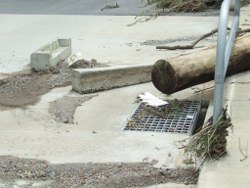|
|
Hard surfacesIncreases in hard surfaces such as pavement, roads and housing development have an impact on the process of run-off, infiltration and erosion. When trees and natural vegetation cover is replaced with hard surfaces the water runs off more quickly and soaks in less. Hard surfaces may cause:
Quick facts
Examples of innovations to address issues associated with hard surfaces include:
References
Last updated: 22 March 2013 This page should be cited as: Department of Environment, Science and Innovation, Queensland (2013) Hard surfaces, WetlandInfo website, accessed 8 May 2025. Available at: https://wetlandinfo.des.qld.gov.au/wetlands/management/pressures/lacustrine-palustrine-threats/hydrology/impervious-surfaces.html |

 — Department of the Environment, Tourism, Science and Innovation
— Department of the Environment, Tourism, Science and Innovation


